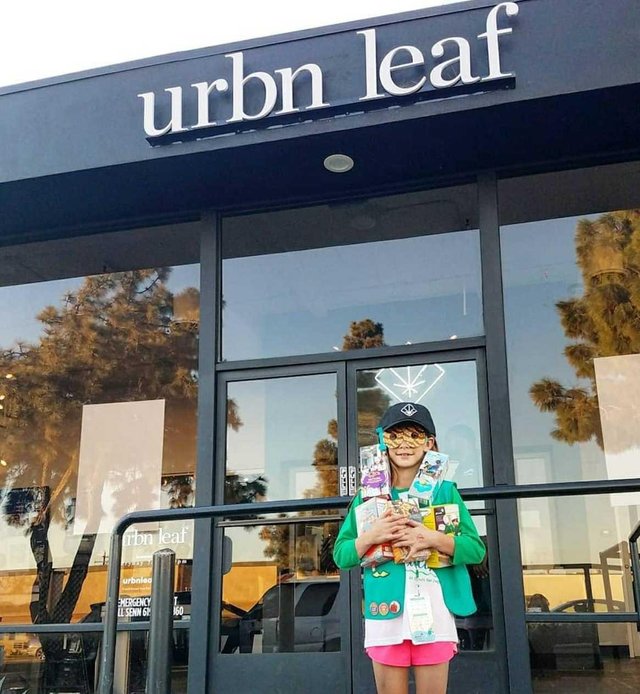A Girl Scout sold 300 boxes of cookies in 6 hours — by setting up near a legal marijuana shop

The brilliant entrepreneurship has drawn some controversy.
By German Lopez
When a Californian Girl Scout had to sell some cookies, she saw a golden opportunity in her state’s new law fully legalizing marijuana.
The Girl Scout in San Diego, who’s not been identified, parked outside of a legal marijuana shop to sell cookies — and she managed to sell more than 300 boxes in six hours. According to the New York Times, that’s likely more than $1,500 raised.
This is simply good business sense, given that the munchies can be a big motivator for buying Girl Scout cookies and other junk food. And it will fund a good cause — much of the money will ultimately go back to the local Girl Scouts organization.
It was also good for Urbn Leaf, the pot shop where the girl sold hundreds of boxes of cookies. The store put out an Instagram photo with the girl, essentially advertising her services — and encouraging people to come along with friends to buy some cannabis. The post drew more than 1,400 likes as of Friday afternoon.
This almost certainly won’t be the last time we see a story like this. After all, 2018 is only the first year of fully legal pot sales in California.
But as Daniel Victor reported for the Times, this presents a problem for some: “While some have praised the plucky scout for figuring out where the demand would probably be, the Girl Scouts organization has been wrestling with how to handle marijuana-adjacent sales as more states have legalized the drug.”
As the responses to the Instagram post show, not everyone was happy with it. Some called it “child endangerment,” while others raised concerns about the girl potentially not knowing the difference between a normal gummy candy and a marijuana-laced one. Supporters of the post pointed out that Girl Scouts are allowed to set up booths near grocery stores, which sell legal (and deadlier) alcohol and tobacco. Will Senn, the founder of Urbn Leaf, told the Times that the post was just meant to support the girl’s fundraising effort.
The Girl Scouts, according to the Times, don’t have a national policy for this kind of situation. Scouts are generally given free rein to sell cookies where they want, but there can be some restrictions and local approval processes for setting up booths. Mike Lopes, a spokesperson for the Girl Scouts of the USA, told the Times that selling in front of a legal pot shop is “not any different than selling in front of any other kind of shop. It just happens to be a marijuana dispensary.”
It’s a different response than what the Girl Scouts of Colorado put out after a Californian Girl Scout in 2014 sold 117 boxes in two hours near a San Francisco medical marijuana dispensary. This was during Colorado’s first year of legal marijuana sales, so the San Francisco entrepreneur drew attention across the country as an example of what might be to come. In response, the Girl Scouts of Colorado tweeted, “If you are wondering, we don’t allow our Girl Scouts to sell cookies in front of marijuana shops or liquor stores/bars.”
The Colorado organization has since relaxed its stance, dealing with such instances on a case-by-case basis rather than a blanket ban.
As more and more states legalize, these kinds of problems are only going to grow: Are people okay with a young girl selling cookies near a business with mind-altering substances? Is it slick business sense, or sending the wrong message to kids? And should the adjacent business be using the girl’s entrepreneurship in its own marketing?
It goes to show that legalization is more than a change in the law; it’s also a dramatic cultural shift. After a century of a drug being demonized through movies like Reefer Madness, criminalization, and public officials (like US Attorney General Jeff Sessions, who said that “good people don’t smoke marijuana”), much of the country is suddenly changing to thinking of pot not as an illicit substance but as a consumer product similar to beer or wine.
The jury is still out on what the effects of that will be. Will it lead to increased marijuana use, including overuse and addiction? Will it hurt public health and academic achievement? Will it cause more car crashes? Experts say we need more time to get answers, because this is a policy that simply has not been tried before at this scale.
But legalization is a move that a big majority of Americans — 64 percent, according to Gallup — support, and a majority of voters in California, Colorado, and six other states have backed. Girls like this Scout are simply taking advantage of the changing times.
I love bots